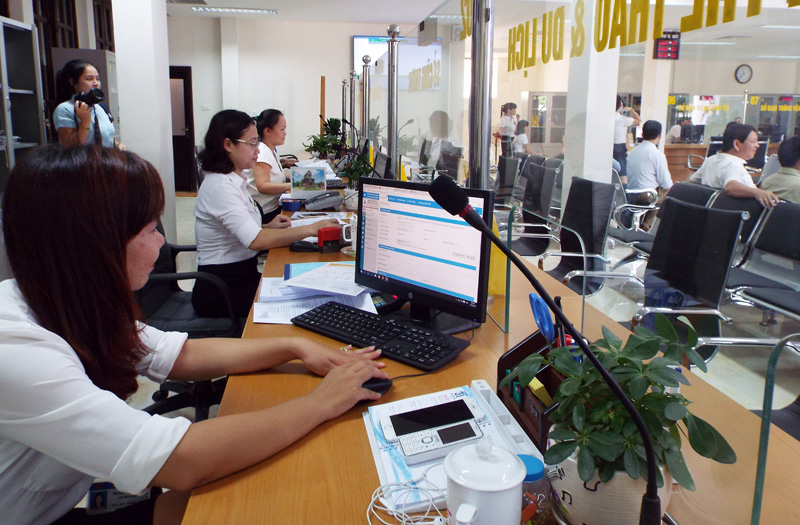
(HBO) – In compliance with the Party and State’s policies in recent years, the northern mountainous province of Hoa Binh has issued a number of mechanisms and policies to fuel the private economy.
They included procedures on investing in commercial housing, public-private partnership projects, incentives for cultivation and fish farming on Hoa Binh lake, agricultural and rural development, and many others that help improve the business climate.
Photo caption: the provincial public administrative centre was officially put into operation on August 1, 2017
The province has so far recorded nearly 2,800 businesses with a total registered capital of 29,382,092 billion VND, 82.5 percent of them are operating stably. Among 277 cooperatives, 155 are still working. There are 449 investment projects in the locality, including 29 foreign-invested ones worth 468 million USD and 420 domestic ones valued at 62,257 billion VND.
The domestic and foreign capital accounted for 67 percent of the total social investment. In 2016, the private economy with foreign direct investment (FDI) made up 48.8 percent of the gross regional domestic product and 63.24 percent of the local manufacturing value, attracting roughly 90.6 percent of the workforce.
However, the growth of the private economy tends to falter, especially those with FDI. Most of private firms have small and medium size, limited technological, governance and financial capacity, and weak competitiveness.
Based on the Party and State’s orientations, the province has directed concerned agencies to devise specific measures to develop the private sector into an important driving force of the local economy. The locality strives to have more than 4,000 firms and cooperatives by 2020 whose operation efficiency doubles that of 2015. Their contributions are expected to account for nearly 50 percent, 60 percent, 70 percent of the provincial gross regional development product by 2020, 2025, and 2030, respectively.
For the 2016-2020 period, corporate investment is expected to be equivalent to more than half of the total social investment while the labour output will increase nearly 8 percent annually on average.
In order to improve the business climate, the provincial authorities have directed specific measures to improve the efficiency of administrative reform, hold dialogues with firms and investors to clear their difficulties and provide them with all possible support, and encourage all economic sectors to engage in production and trade.
After more than four years of implementing a project launched by the Hoa Binh Party Committee’s Standing Board on developing agriculture and promoting product consumption linked with building new-style rural areas for the 2021-2025 period, the province’s industry and trade sector has made significant strides, greatly contributing to local socio-economic development.
Luong Son district has identified 2025 as the year for the accelerated breakthrough to successfully implement the socio-economic development plan for the 5-year period from 2021 to 2025. The district has been focusing on executing the plans and trying to achieve a GRDP growth rate of approximately 15%.
Since the beginning of this year, under the direction of the Department of Agriculture and Environment, the Sub-Department of Agricultural, Forestry, and Fishery Product Quality Management has strengthened the integration of the professional activities to promote and guide the organizations and individuals in the production and trading of agricultural, forestry, and fishery products to comply with the legal regulations regarding the use of chemicals, pesticides and veterinary medicines in crop cultivation, livestock farming and aquaculture. They also provide guidance to processing and manufacturing establishments on keeping the records to trace the product origins and using food additives from the approved list according to the regulations.
Hoa Binh province saw a significant rise in state budget revenue in the first two months of 2025, heard a meeting chaired by Vice Chairman of the provincial People’s Committee Quach Tat Liem.
Ha Thi Ha Chi, a 26-year-old graduate in law, has taken an unconventional path by returning to her hometown in Mai Chau district to establish the Tong Dau Cooperative, creating stable jobs for local women and bringing Thai ethnic brocade weaving to the global market.
As the Lunar New Year 2025 approached, pork prices surged, creating a profitable season for farmers in Tan Vinh commune, Luong Son district. Taking advantage of the rising demand, Can Minh Son, a farmer from Coi hamlet, sold over 30 pigs at 69,000 VND/kg, each weighing more than 100 kg. After deducting expenses, his family earned a profit of over 50 million VND.



